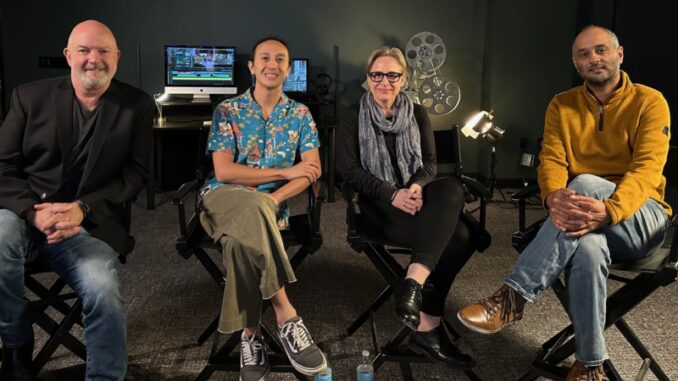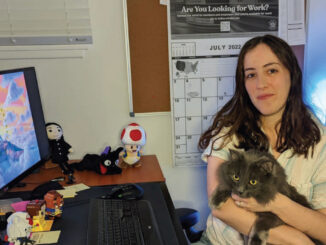
By Matt Allen
How has the editor-assistant relationship changed in recent years? A well-known picture editor has some thoughts – and despite all the flux of recent years, he’s still a big believer in in-person mentoring.
Editor Vikash Patel, known for his work on hit shows like “Ozark” and “The Morning Show,” sat down earlier this year with Avid’s product marketing and “evangelist” Michael Krulik to discuss today’s editor/ assistant editor relationship.
Patel, an Emmy-winning editor and a graduate of the AFI film school, is editing the HBO/A24 miniseries “The Sympathizer” starring Robert Downey Jr., with several episodes directed by Park Chan-wook. The show, based on the Pulitzer Prize-winning novel of the same name, is an espionage thriller and satire about a communist spy during the final days of the Vietnam War. The first trailer was released in time for Warner Bros. Discovery Inc.’s investor meeting in April.
Assistant editors Victoria Lang and Julian Doan from “The Sympathizer” also joined the conversation live from Avid’s Burbank office in April.
Even though the event was sponsored by Avid Media Composer, the dominant non-linear editing program at the studio level today, it quickly became evident that the technical skills beyond the Avid are important for an assistant editor.
As Patel put it, “On top of your assistant editor doing a good job, I think you have to enjoy being with your assistant editor because you spend between 9 to 12 hours a day with them. So, you’re spending as much time with them as [with] your partner or your wife or your husband. And for me specifically, I want someone who shares the same taste and sensibility as myself. I like an assistant to take pride in the work, especially when I hand them sound and VFX work. I want the sound work to be their baby.”
And the nature of this relationship has begun to change with the rise of working at home; work on “The Sympathizer” has been mostly remote.
“I feel the remote workflow is detrimental to the mentoring aspect of what we do. And that’s why I don’t gravitate towards things like Slack. I’m picking up the phone because talking is how I would do it in a physical space. I love sharing which includes having my assistants cutting scenes and watching dailies with them,” Patel said. His strong desire to mentor becomes harder when working remote, because there are more steps to engage with coworkers, and that personal connection can be lost.
However, the editors who are willing to take those extra steps may find a win-win situation with their assistants.
“I just try to constantly engage with my assistants Victoria and Julian as filmmakers because I know they are stellar at their assistant work,” Patel said. “That’s like muscle memory for both of them. We just watched the pilot episode yesterday and then we did a Facetime session for an hour to talk about their thoughts for how we could make this better. And I called them individually after as well. I think engaging in this way is one aspect that helps with the remote workflow…It forces me to articulate my decisions. That’s what I love about it. I like to cut from a place of feeling. I don’t like to intellectualize stuff. If it feels right, I’m going to run with it.”
And this mentality towards engaging assistants creatively really changes things for the assistant editor. As Lang explained, “Vikash would do things and say, ‘Take a look at this.’ And it’s so fun. I’ve done the dailies. I’ve done the sound. And he tries things and he is constantly asking for me to watch his work. At first when he asked, I was very tempered with what I would say. But then I started to say things like ‘I don’t like that’ or ‘Why didn’t you choose this?’ And Vikash was very responsive because he is like that with his directors. He doesn’t just say no. It’s way more fun because it gets your brain thinking about editing.”
And using “old school” technology like a phone call or video call allows for that personal connection and a safe space to be creative together at the same time. Creativity within a team is not meant to be asynchronous.
As assistant editor Doan described it: “The past four editors I’ve assisted have not been in Los Angeles. They have been in places like Atlanta, Scotland, and Sao Paulo, Brazil. The tough thing about working remote is if you’re going to say something thru Slack or written communication, you will censor your own ideas. What I like about getting on the phone is you go through the process of talking through the bad ideas and then arrive at the good stuff.”
Patel said he’s looking for a “companion” when hiring an assistant editor. To illustrate his point, he recalled the process of looking for a new assistant editor while editing “Smallville.” “The post producer gave me a laundry list of some assistants and after whittling it down to a couple I called Cedric Nairn-Smith. After introducing myself, he said ‘I’m about to walk into a movie.’”
Cedric quickly pivoted and was willing to forgo the movie in order to speak with Vikash because he had lost out on job opportunities before. As Vikash recalled, “This was an opportunity for him to change course. I saw his resume and he had worked on big movies but wanted to become an editor…It was just a little thing of his attitude that went such a long way for me. The attitude that I’ve lost jobs so I’m not going to the movie. I’ll talk to you. And I knew straight from that moment he was going to be my assistant. And he was my assistant for seven years and his now doing amazing stuff in the Marvel world as an editor.”
Viewers can see for themselves the work that Patel and his assistant editors did when “The Sympathizer” premieres in 2024.





